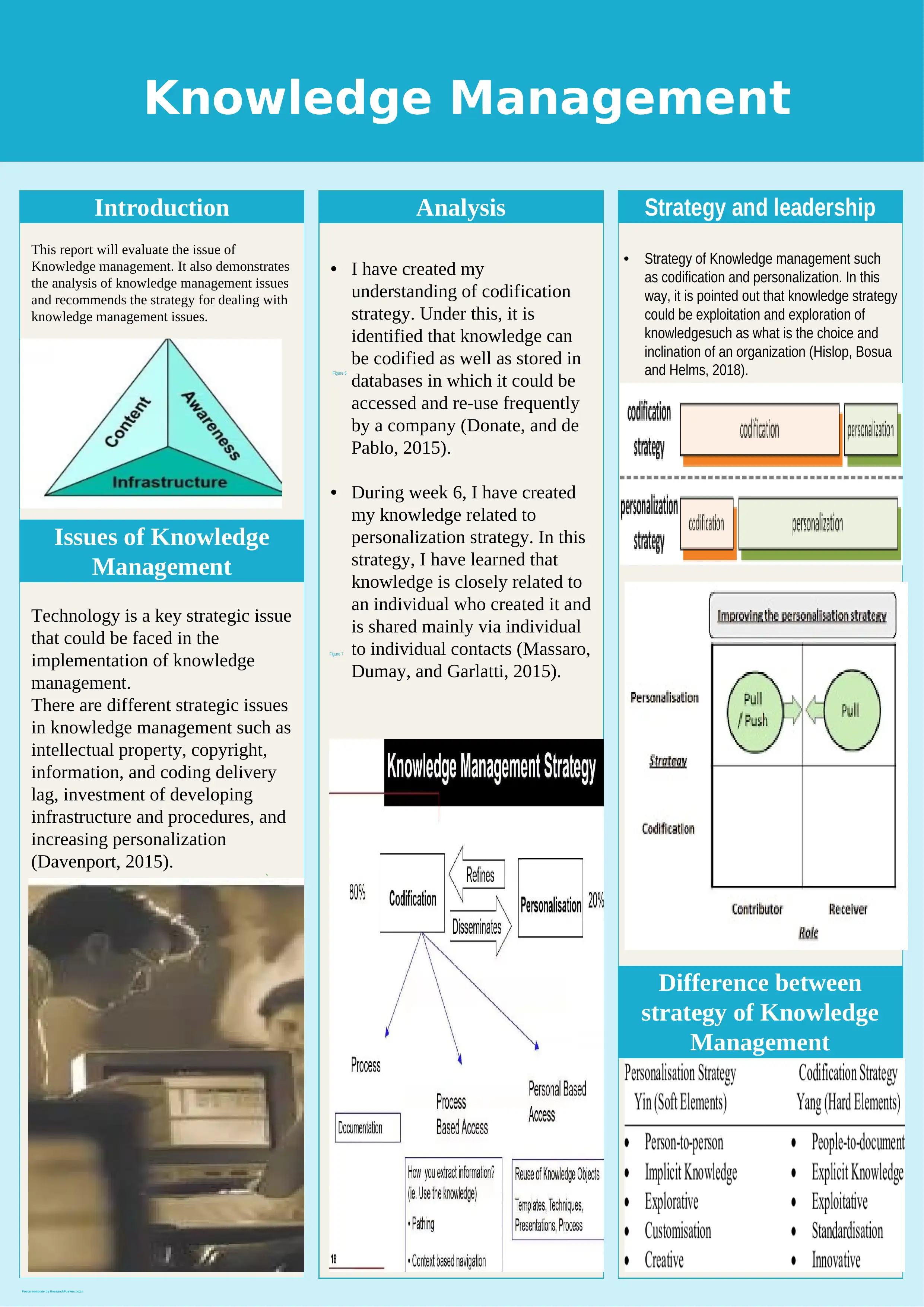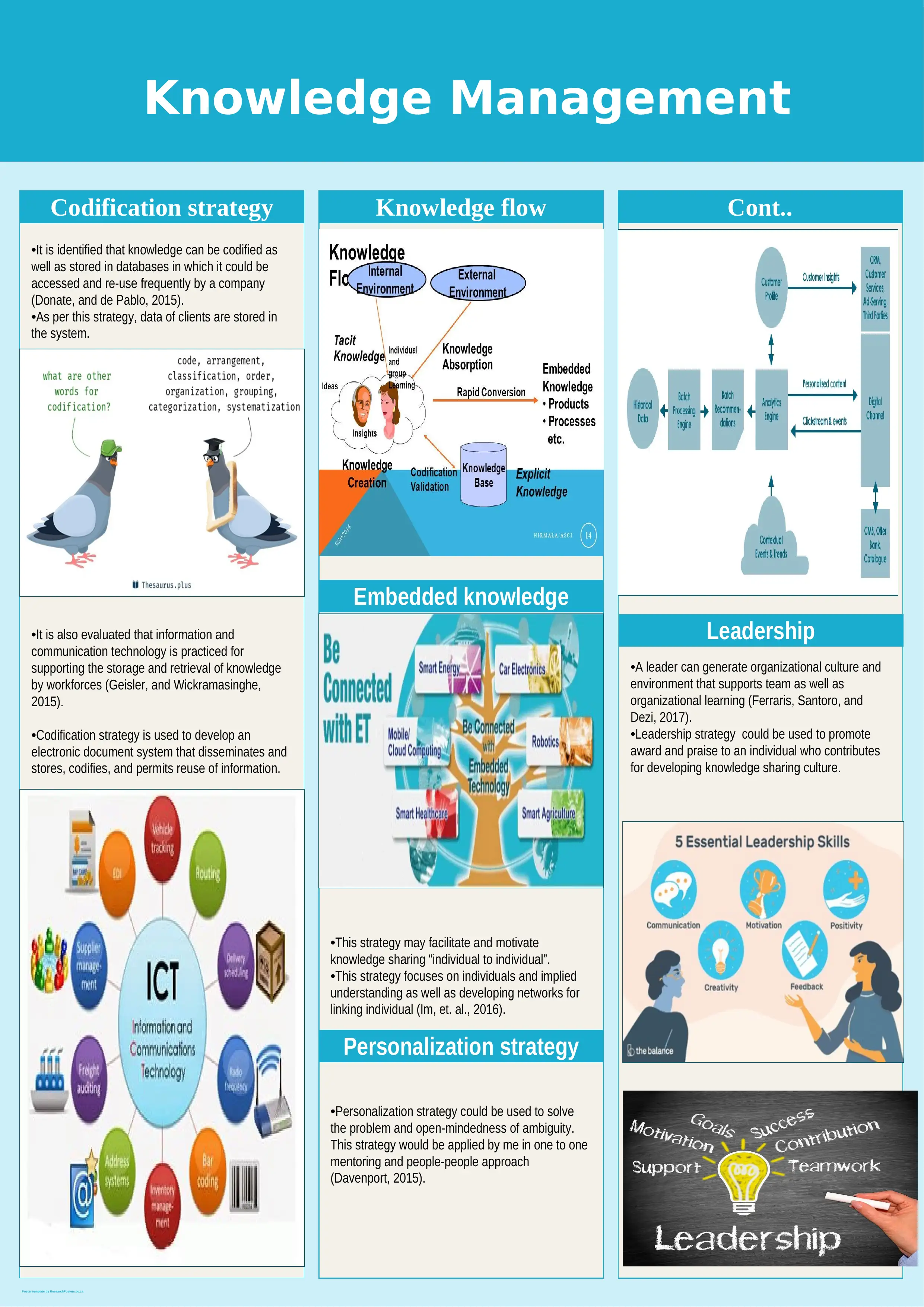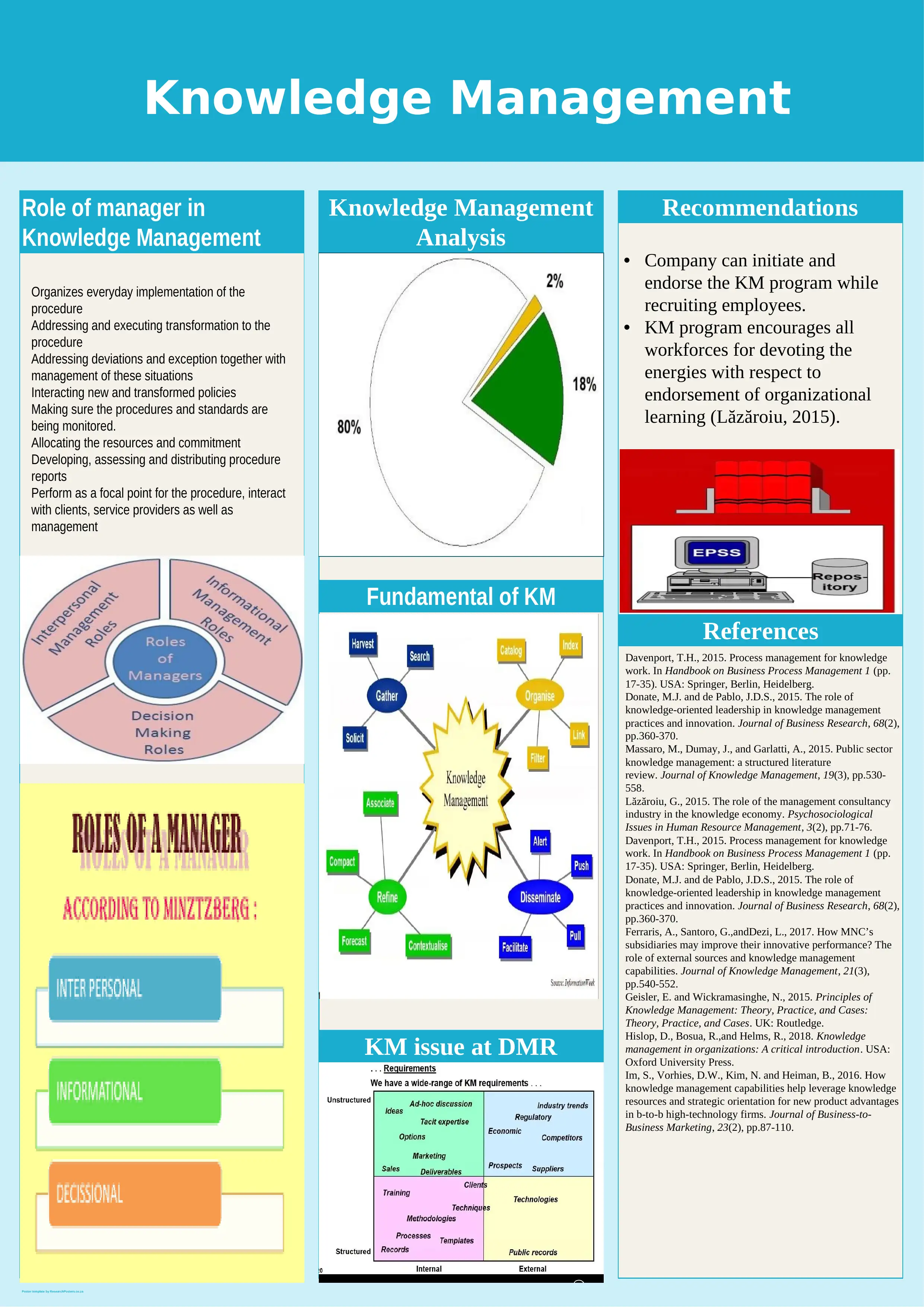Knowledge Management: Strategies, Issues, and Recommendations Report
VerifiedAdded on 2023/04/20
|3
|1004
|413
Report
AI Summary
This report provides an analysis of knowledge management, exploring codification and personalization strategies. It discusses the role of technology, leadership, and the manager's role in implementing knowledge management procedures. The report highlights strategic issues such as intellectual property and the importance of organizational learning. It also examines codification and personalization strategies, emphasizing how these strategies facilitate knowledge sharing and address ambiguity. Furthermore, the report offers recommendations for companies to initiate and endorse knowledge management programs, encouraging workforce participation and the development of a knowledge-sharing culture. The report concludes by emphasizing the importance of leadership in fostering an environment that supports team and organizational learning.

Poster template by ResearchPosters.co.za
Knowledge Management
Introduction
This report will evaluate the issue of
Knowledge management. It also demonstrates
the analysis of knowledge management issues
and recommends the strategy for dealing with
knowledge management issues.
Issues of Knowledge
Management
A
B
Analysis
• I have created my
understanding of codification
strategy. Under this, it is
identified that knowledge can
be codified as well as stored in
databases in which it could be
accessed and re-use frequently
by a company (Donate, and de
Pablo, 2015).
• During week 6, I have created
my knowledge related to
personalization strategy. In this
strategy, I have learned that
knowledge is closely related to
an individual who created it and
is shared mainly via individual
to individual contacts (Massaro,
Dumay, and Garlatti, 2015).
Figure 5
Strategy and leadership
Technology is a key strategic issue
that could be faced in the
implementation of knowledge
management.
There are different strategic issues
in knowledge management such as
intellectual property, copyright,
information, and coding delivery
lag, investment of developing
infrastructure and procedures, and
increasing personalization
(Davenport, 2015).
Figure 7
• Strategy of Knowledge management such
as codification and personalization. In this
way, it is pointed out that knowledge strategy
could be exploitation and exploration of
knowledgesuch as what is the choice and
inclination of an organization (Hislop, Bosua
and Helms, 2018).
Difference between
strategy of Knowledge
Management
Knowledge Management
Introduction
This report will evaluate the issue of
Knowledge management. It also demonstrates
the analysis of knowledge management issues
and recommends the strategy for dealing with
knowledge management issues.
Issues of Knowledge
Management
A
B
Analysis
• I have created my
understanding of codification
strategy. Under this, it is
identified that knowledge can
be codified as well as stored in
databases in which it could be
accessed and re-use frequently
by a company (Donate, and de
Pablo, 2015).
• During week 6, I have created
my knowledge related to
personalization strategy. In this
strategy, I have learned that
knowledge is closely related to
an individual who created it and
is shared mainly via individual
to individual contacts (Massaro,
Dumay, and Garlatti, 2015).
Figure 5
Strategy and leadership
Technology is a key strategic issue
that could be faced in the
implementation of knowledge
management.
There are different strategic issues
in knowledge management such as
intellectual property, copyright,
information, and coding delivery
lag, investment of developing
infrastructure and procedures, and
increasing personalization
(Davenport, 2015).
Figure 7
• Strategy of Knowledge management such
as codification and personalization. In this
way, it is pointed out that knowledge strategy
could be exploitation and exploration of
knowledgesuch as what is the choice and
inclination of an organization (Hislop, Bosua
and Helms, 2018).
Difference between
strategy of Knowledge
Management
Paraphrase This Document
Need a fresh take? Get an instant paraphrase of this document with our AI Paraphraser

Poster template by ResearchPosters.co.za
Knowledge Management
Codification strategy
•It is identified that knowledge can be codified as
well as stored in databases in which it could be
accessed and re-use frequently by a company
(Donate, and de Pablo, 2015).
•As per this strategy, data of clients are stored in
the system.
A
B
Knowledge flow Cont..
•It is also evaluated that information and
communication technology is practiced for
supporting the storage and retrieval of knowledge
by workforces (Geisler, and Wickramasinghe,
2015).
•Codification strategy is used to develop an
electronic document system that disseminates and
stores, codifies, and permits reuse of information.
Embedded knowledge
•This strategy may facilitate and motivate
knowledge sharing “individual to individual”.
•This strategy focuses on individuals and implied
understanding as well as developing networks for
linking individual (Im, et. al., 2016).
Personalization strategy
•Personalization strategy could be used to solve
the problem and open-mindedness of ambiguity.
This strategy would be applied by me in one to one
mentoring and people-people approach
(Davenport, 2015).
Leadership
•A leader can generate organizational culture and
environment that supports team as well as
organizational learning (Ferraris, Santoro, and
Dezi, 2017).
•Leadership strategy could be used to promote
award and praise to an individual who contributes
for developing knowledge sharing culture.
Knowledge Management
Codification strategy
•It is identified that knowledge can be codified as
well as stored in databases in which it could be
accessed and re-use frequently by a company
(Donate, and de Pablo, 2015).
•As per this strategy, data of clients are stored in
the system.
A
B
Knowledge flow Cont..
•It is also evaluated that information and
communication technology is practiced for
supporting the storage and retrieval of knowledge
by workforces (Geisler, and Wickramasinghe,
2015).
•Codification strategy is used to develop an
electronic document system that disseminates and
stores, codifies, and permits reuse of information.
Embedded knowledge
•This strategy may facilitate and motivate
knowledge sharing “individual to individual”.
•This strategy focuses on individuals and implied
understanding as well as developing networks for
linking individual (Im, et. al., 2016).
Personalization strategy
•Personalization strategy could be used to solve
the problem and open-mindedness of ambiguity.
This strategy would be applied by me in one to one
mentoring and people-people approach
(Davenport, 2015).
Leadership
•A leader can generate organizational culture and
environment that supports team as well as
organizational learning (Ferraris, Santoro, and
Dezi, 2017).
•Leadership strategy could be used to promote
award and praise to an individual who contributes
for developing knowledge sharing culture.

Poster template by ResearchPosters.co.za
Knowledge Management
Role of manager in
Knowledge Management
Organizes everyday implementation of the
procedure
Addressing and executing transformation to the
procedure
Addressing deviations and exception together with
management of these situations
Interacting new and transformed policies
Making sure the procedures and standards are
being monitored.
Allocating the resources and commitment
Developing, assessing and distributing procedure
reports
Perform as a focal point for the procedure, interact
with clients, service providers as well as
management
A
B
Knowledge Management
Analysis
Recommendations
References
• Company can initiate and
endorse the KM program while
recruiting employees.
• KM program encourages all
workforces for devoting the
energies with respect to
endorsement of organizational
learning (Lăzăroiu, 2015).
Davenport, T.H., 2015. Process management for knowledge
work. In Handbook on Business Process Management 1 (pp.
17-35). USA: Springer, Berlin, Heidelberg.
Donate, M.J. and de Pablo, J.D.S., 2015. The role of
knowledge-oriented leadership in knowledge management
practices and innovation. Journal of Business Research, 68(2),
pp.360-370.
Massaro, M., Dumay, J., and Garlatti, A., 2015. Public sector
knowledge management: a structured literature
review. Journal of Knowledge Management, 19(3), pp.530-
558.
Lăzăroiu, G., 2015. The role of the management consultancy
industry in the knowledge economy. Psychosociological
Issues in Human Resource Management, 3(2), pp.71-76.
Davenport, T.H., 2015. Process management for knowledge
work. In Handbook on Business Process Management 1 (pp.
17-35). USA: Springer, Berlin, Heidelberg.
Donate, M.J. and de Pablo, J.D.S., 2015. The role of
knowledge-oriented leadership in knowledge management
practices and innovation. Journal of Business Research, 68(2),
pp.360-370.
Ferraris, A., Santoro, G.,andDezi, L., 2017. How MNC’s
subsidiaries may improve their innovative performance? The
role of external sources and knowledge management
capabilities. Journal of Knowledge Management, 21(3),
pp.540-552.
Geisler, E. and Wickramasinghe, N., 2015. Principles of
Knowledge Management: Theory, Practice, and Cases:
Theory, Practice, and Cases. UK: Routledge.
Hislop, D., Bosua, R.,and Helms, R., 2018. Knowledge
management in organizations: A critical introduction. USA:
Oxford University Press.
Im, S., Vorhies, D.W., Kim, N. and Heiman, B., 2016. How
knowledge management capabilities help leverage knowledge
resources and strategic orientation for new product advantages
in b-to-b high-technology firms. Journal of Business-to-
Business Marketing, 23(2), pp.87-110.
Fundamental of KM
KM issue at DMR
Knowledge Management
Role of manager in
Knowledge Management
Organizes everyday implementation of the
procedure
Addressing and executing transformation to the
procedure
Addressing deviations and exception together with
management of these situations
Interacting new and transformed policies
Making sure the procedures and standards are
being monitored.
Allocating the resources and commitment
Developing, assessing and distributing procedure
reports
Perform as a focal point for the procedure, interact
with clients, service providers as well as
management
A
B
Knowledge Management
Analysis
Recommendations
References
• Company can initiate and
endorse the KM program while
recruiting employees.
• KM program encourages all
workforces for devoting the
energies with respect to
endorsement of organizational
learning (Lăzăroiu, 2015).
Davenport, T.H., 2015. Process management for knowledge
work. In Handbook on Business Process Management 1 (pp.
17-35). USA: Springer, Berlin, Heidelberg.
Donate, M.J. and de Pablo, J.D.S., 2015. The role of
knowledge-oriented leadership in knowledge management
practices and innovation. Journal of Business Research, 68(2),
pp.360-370.
Massaro, M., Dumay, J., and Garlatti, A., 2015. Public sector
knowledge management: a structured literature
review. Journal of Knowledge Management, 19(3), pp.530-
558.
Lăzăroiu, G., 2015. The role of the management consultancy
industry in the knowledge economy. Psychosociological
Issues in Human Resource Management, 3(2), pp.71-76.
Davenport, T.H., 2015. Process management for knowledge
work. In Handbook on Business Process Management 1 (pp.
17-35). USA: Springer, Berlin, Heidelberg.
Donate, M.J. and de Pablo, J.D.S., 2015. The role of
knowledge-oriented leadership in knowledge management
practices and innovation. Journal of Business Research, 68(2),
pp.360-370.
Ferraris, A., Santoro, G.,andDezi, L., 2017. How MNC’s
subsidiaries may improve their innovative performance? The
role of external sources and knowledge management
capabilities. Journal of Knowledge Management, 21(3),
pp.540-552.
Geisler, E. and Wickramasinghe, N., 2015. Principles of
Knowledge Management: Theory, Practice, and Cases:
Theory, Practice, and Cases. UK: Routledge.
Hislop, D., Bosua, R.,and Helms, R., 2018. Knowledge
management in organizations: A critical introduction. USA:
Oxford University Press.
Im, S., Vorhies, D.W., Kim, N. and Heiman, B., 2016. How
knowledge management capabilities help leverage knowledge
resources and strategic orientation for new product advantages
in b-to-b high-technology firms. Journal of Business-to-
Business Marketing, 23(2), pp.87-110.
Fundamental of KM
KM issue at DMR
⊘ This is a preview!⊘
Do you want full access?
Subscribe today to unlock all pages.

Trusted by 1+ million students worldwide
1 out of 3
Related Documents
Your All-in-One AI-Powered Toolkit for Academic Success.
+13062052269
info@desklib.com
Available 24*7 on WhatsApp / Email
![[object Object]](/_next/static/media/star-bottom.7253800d.svg)
Unlock your academic potential
Copyright © 2020–2026 A2Z Services. All Rights Reserved. Developed and managed by ZUCOL.




